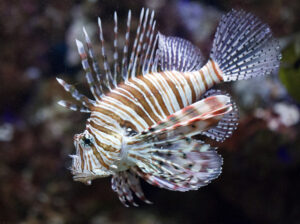In the early 1990s, a few lionfish, perhaps a half dozen, were released into the warm waters of the South Atlantic. For aquarium enthusiasts, these fish imported from the western Pacific are showstoppers. Their long colorful fins wave gracefully as they swim, drawing attention like the plumes on a strutting peacock. In addition to their beauty, they also are also known to be voracious predators and prodigious reproducers, with females releasing up to two million eggs a year.
They now populate the coastal waters of the Southeast United States and the Caribbean where they are depopulating coral reefs of the native fish who live within their nooks and crannies. The lionfish hunts its prey in a manner previously unknown in this part of the ocean, making native fish unusually vulnerable. By rapidly fanning its fins, it is able to herd juvenile fish into corners with no escape and then suddenly suck them into its mouth like a vacuum. Reefs that have been continuously studied for many years by marine biologists are now barren of fish, and with no herbivores present to keep the plants in check, sea grass is growing over the reefs.
Once prized for their exotic looks, lionfish are now viewed as dangerous invaders putting other fish and marine habitats at risk. The Caribbean Fisheries Management Council has taken a cue from western frontier days by creating posters broadcasting “Mas Bucsado—Pez Leon—Preferriblemente Muerto” or “Most Wanted—Lionfish—Dead not Alive.” Scientists with NOAA have launched their own campaign to rid the region of lionfish. “Eat Lionfish” is their mantra. The fish is light, delicate, and tasty once the venomous spines and poison sacs have been removed, and it is a popular item on Asian menus. The scientists are encouraging chefs to develop new recipes and restaurants as far north as Washington, D.C., are now offering lionfish fritters and even ceviche.
Markets have always had a powerful impact on the fishing industry. As consumer demand for one type of fish grew, fishers responded, sometimes by nearly fishing that species out of existence. Scientists are now working to help recover these populations and restore the integrity of the fisheries. In the case of lionfish, however, scientists would like nothing more than to employ markets to drive the lionfish to extinction in the South Atlantic. Unfortunately, this slippery predator has yet another survival advantage. It cannot be hooked or netted, and is typically hunted with a spear. Unless spear fishing suddenly catches on in a big way, a market solution to this problem might be out of reach. But it was a good thought.
For more information visit: www.caribbeanfmc.com/LIONFISH/lionfish.htm



